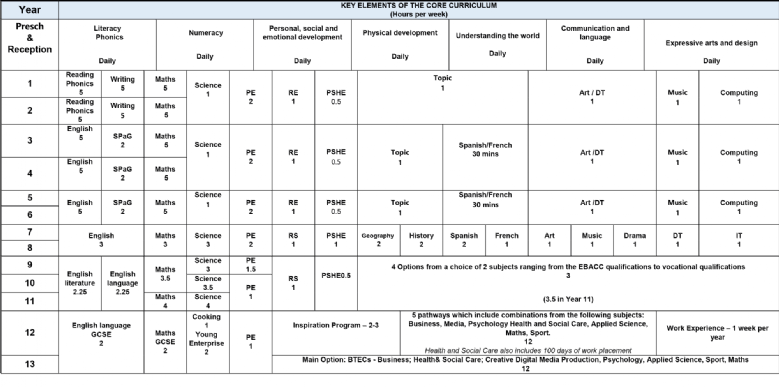
CURRICULUM
» Curriculum Intent
» Cognition Curriculum
» Culture Curriculum
» Core Curriculum
» Key Stage and Phase Curricula
» Careers
» Key Elements of the Core Curriculum (Hours per Week)
CURRICULUM INTENT
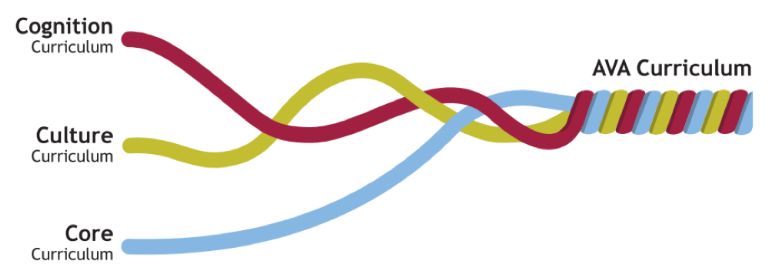
The Aylesbury Vale Academy (AVA) is an all-through academy and the curriculum we follow develops and grows with our students as they move from the Early Years Foundation Stage, through each of the Key Stages and into the Sixth Form (Key Stage 5). The aim of this curriculum is to provide an inclusive, broad and balanced education which prepares our students by giving them the best possible chances for their future life choices and helping them to discover their role in society, where they will make valued contributions. To meet these aims the AVA curriculum has been designed to have three threads running through it which we refer to as the 3 Cs: Cognition, Culture and Core.
We believe that the 3 Cs are integral to meeting the needs of our students. AVA is a large community and a high proportion of our students come from backgrounds where they benefit from being taught how to become effective independent learners. The Cognition Curriculum aims to teach students how to learn effectively and with an ever-increasing degree of independence.
Many of our students do not get the opportunity to travel in the UK or abroad, visit museums or enjoy other culturally enhancing opportunities. This places them at a cultural, and therefore, academic disadvantage. The Cultural Curriculum, our broad Core offering, and our three-year Key Stage Four curriculum helps to put our students on an equal footing with their peers nationally.
Between 2016 and 2023 a focus on the Core Curriculum helped our Year 2, 6, 11 and 13 students exceed national averages. Our Progress Eight measure has risen from -0.64 to 0.22 1 and the percentage of primary students achieving Age Related Expectations and making progress exceeds the national average. Students now leave having made more progress because they attended AVA including securing increasingly aspirational and competitive career pathways.
AVA makes a difference to the lives of its students, opening doors and providing them with routes into further education, employment or apprenticeships which otherwise would not have been available. The difficulties faced in 2020, 2021 and beyond have impacted the delivery of all areas of the AVA Curriculum. They have underlined the importance of providing students with greater life chances through the breadth and ambition of their experience at AVA.
1 Provisional data based on SISRA comparisons.
COGNITION CURRICULUM
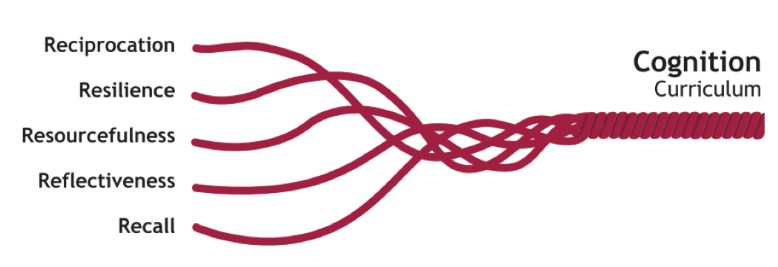
The Cognition Curriculum teaches students how to become effective learners by developing the key skills of Reciprocation, Resilience, Resourcefulness, Reflectiveness and Recall. We teach these skills explicitly because they help our students to become faster, better and more confident learners. By investing in the development of these learning skills at early stages in the curriculum our students benefit as they are able to use their learning skills throughout their education and life. This investment pays dividends over time both at later stages in the curriculum and beyond as they become lifelong learners.
Reciprocation – working together to become better learners
Resilience – believing in ourselves and viewing challenges as opportunities for better learning (one of our Academy values)
Resourcefulness – exploring a variety of creative strategies to overcome challenges
Reflectiveness – thinking about what we are good at and what we need to do to improve to become better learners
Recall – using a variety of ways to remember the facts, ideas and techniques that we have learned
CULTURE CURRICULUM
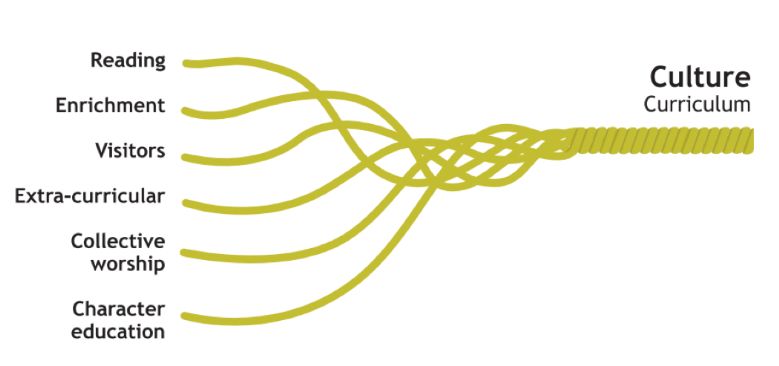
The Culture Curriculum is how we build on the National Curriculum to develop the whole pupil into well-balanced citizens who have a wide range of rich cultural experiences and positively contribute to their community. It is underpinned by our drive to ensure our students read widely and regularly, both for enjoyment and to learn. It is our aspiration that students' life chances are enhanced because of these experiences.
Students take part in local and international visits, join a range of clubs and meet regular visitors to stretch their learning and share experiences beyond what is possible in the traditional classroom environment.
Reading – reading allows our students to dive into experiences which they would otherwise not access. Many of our students join AVA with below average reading ages and we are determined to ensure that this trend is reversed over time. Reading is a skill which underpins every other aspect of our curriculum, and we are keen to use reading to allow students to explore their own passions and interests as well as providing a broader experience in their taught lessons.
Enrichment – our aim is for every child to participate in a minimum of one excursion per academic year (although many experience much more than this). We also invite in outside speakers, offer a wide range of clubs and careers events. These opportunities ensure that they are able to link the learning which takes place inside the classroom to the real world, including primary WOW moments which enrich learning.
Visitors - We regularly invite experts into AVA to inform students about their field of expertise. We aim for every child to receive a minimum of one visitor per academic year (although many experience much more than this) to share the experiences which build on and reach beyond what is learnt in the classroom.
Extra-curricular - Students have a wide variety of extra-curricular opportunities which are offered for them to select from on a voluntary basis from Year 2 to Year 13. Primary clubs are offered at a minimal cost and secondary clubs are free.
Collective worship – as a Church of England Academy, the AVA community is underpinned by acts of collective worship. Students and staff gather together at least once a week in year groups or key stages. These opportunities are used to share our core values and beliefs. We also offer daily opportunities for reflection, within the classroom, assemblies and quiet times.
Character education – AVA serves a diverse community, working with students from a broad range of faiths, and some with none. Our core values of Respect, Aspiration, and Resilience apply to every member of our community and work in harmony with Christian and British values.
CORE CURRICULUM
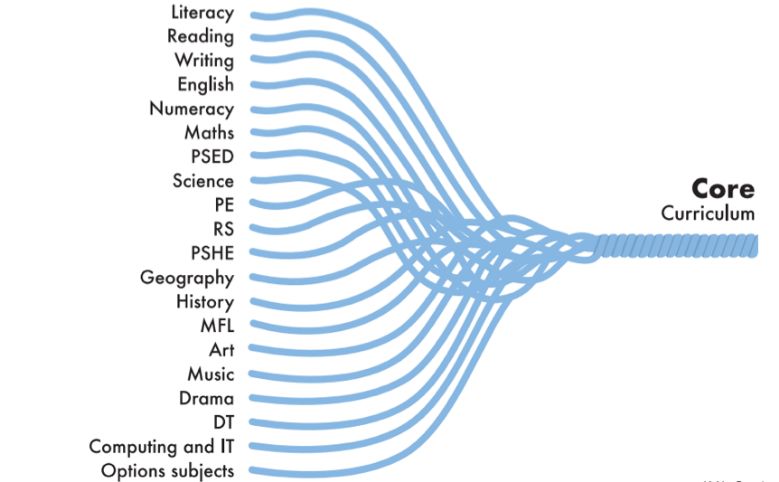
The Core Curriculum at AVA varies as students travel through the school. This always includes the core features of Reading, Writing and Numeracy.
KEY STAGE AND PHASE CURRICULA
Early Years Foundation Stage (Pre School and Reception)
The Foundation Stage provides the curriculum framework for practitioners working from birth to the end of the Reception year. It is a distinct phase that provides rich and diverse opportunities for lifelong learning. Our aim is to provide a caring, safe and stimulating environment where every child feels empowered to develop as an independent learner. Our practitioners will provide opportunities that build upon students’ experiences and interests to enable all children to reach their potential in every aspect of their development.
The Curriculum is divided into three Prime Areas - Personal, Social and Emotional Development; Physical Development; Communication and Language and four Specific areas - Literacy; Mathematics; Understanding the World; Expressive Arts and Design. Each area provides expectations for a child's development within specific age brackets culminating in an early learning goal. Staff use the curriculum to help trace each child's progress throughout their time in EYFS. Children work towards being able to achieve these early learning goals by the end of their reception year in school. By focusing on these areas, children form a firm foundation on which to build future learning and help them develop the skills necessary for developing reading and writing, for understanding of the world and for engaging with the arts and design.
We place high importance on developing children’s physical and emotional well-being. Through early observation our practitioners create an environment in which all our children can thrive. Through a rich choice of play-based activities as well as group and individual learning with teachers and other adults, the children develop the skills of listening and developing language to express their ideas, thoughts and feelings; they develop the skills to control and coordinate their bodies and handle equipment and resources and they develop an awareness of themselves, of others and of their feelings and relationships.
Through our reading curriculum, we expose children to a broad range of texts and teach them how to develop an understanding of what they read. Exposure to reading begins in our Pre-School, where pre-phonics is taught. Children are also exposed to good quality texts where they are a part of story-mapping and discussions based around the texts. In Reception and Key Stage One, Read Write Inc Phonics is taught to fully embed those early reading skills necessary to build independent, confident readers.
Much of the curriculum at AVA is integrated through an overall topic or theme. This helps the children to apply and make sense of their learning and to make connections between different subjects, whilst constantly reinforcing and practicing key skills, such as reading, writing and numeracy taught in their daily mathematics, literacy, and phonics sessions.
Key Stage One (Years 1 and 2)
In Key Stage One (and particularly Year 1) children experience a similar environment to that of the Early Years Foundation Stage to ensure there is a smooth transition between the year groups, increasing formality as they progress towards the end of Year 2. Once children have completed the Early Years Foundation Stage they follow the programmes of study from the National Curriculum and the Buckinghamshire Agreed Syllabus for Religious Education. Children participate in daily Read Write Inc Inc phonics lessons and daily guided reading sessions, which are set by ability and are additional to daily English and mathematics lessons.
We use Talk for Writing in our English lessons. All children are supported throughout the writing process. Staff model writing at every opportunity, as well as modelling editing skills. The ‘talk’ within our writing curriculum is a key component to creating confident and independent writers in all genres of writing, who are able to write with empathy and for effect.
Where appropriate, this is linked to an overall theme or topic which links other subjects (science, history, geography, music, art and design technology) together to help make learning engaging and relevant and to promote the development of key skills across the whole curriculum. Children listen to and read class stories and have opportunities to read a range of fiction and non-fiction books in class.
In Maths we follow the White Rose Scheme of work which develops the fundamental skills of fluency, reasoning and problem solving. Children are encouraged to explore challenges in a range of ways; pictorial, concrete and abstract. Resources are readily available in all classes to support children’s learning and we encourage children to independently self-access these resources to encourage independence.
Key Stage Two (Years 3, 4, 5 and 6)
At Key Stage Two children continue to follow a challenging and engaging curriculum with a strong focus on literacy and language, which contributes to increased rates of progress for our children.
A continued topic-based approach to much of the curriculum helps the children to apply and make sense of their learning and to make connections between different subjects, whilst constantly reinforcing and practicing key skills, such as reading, writing and numeracy taught in their daily literacy, phonics and mathematics sessions.
Additionally, primary colleagues work closely with colleagues from the secondary phase to utilise the skills of subject specialist staff to work with both children and teachers and to share best practice from both phases in Physical Education and languages. This joint working has the twin aims of ensuring children achieve well above national expectations in Key Stage Two and that they may continue to make rapid progress as they move towards and into the secondary phase.
Children are set clear learning objectives and sharp, measurable success criteria within each lesson or sequence of lessons. This enables staff and children to evaluate their own and each other’s learning and set targets for future improvement. This daily, ‘formative’ assessment is used to plan next steps for children to ensure they make maximum progress.
The school closely measures attainment and progress at key points in each school year and across a child’s school career using Early Years Foundation Stage or National Curriculum. Teachers compare pupils’ attainment and progress with national expectations, against their own prior attainment and against different groups within the school. This information is used to set targets for groups and individuals and to identify where additional support is needed.
Key Stage Three (Years 7 and 8)
At Key Stage Three students are almost exclusively taught by subject specialists and they follow a timetable which covers 15 subjects (broader than the National Curriculum). Students have at least one lesson per week of every subject rather than a carousel of Arts subjects.
All students study French and Spanish to engender a love of languages rather than a route which makes languages compulsory at Key Stage Four. These are the languages most commonly taught by pour feeder primaries and secondary languages teachers also deliver French and Spanish to Key Stage Two students to aid the transition from primary to secondary in terms of language acquisition.
Reading is central to our curriculum with a range of strategies used to both develop students reading skills and engender a love of reading. All students in Key Stage Three have reading as one of their weekly tutor time activities where they follow our AVA ‘Big Read’ programme. Each year group has an annual ‘tutor group reader’ that develops independent reading along with short activities to promote active reading. For example, Year 8 students are all currently reading ‘Coraline’ by Neil Gaiman. The goal is to ‘gift’ these students the text at the end of the year. English lessons also support our in-house ‘Read to Succeed’ programme which promotes library borrowing and active reading tasks linked to texts borrowed. Students receive ‘Bronze’, ‘Silver’ and ‘Gold’ awards linked to their library borrowing. The whole school literacy lead also leads our ‘Whooo’s Reading’ programme through English lessons where students complete online activities linked to the reading of their choice. This allows us to measure engagement as well as progress in their comprehension.
At the end of Year 8, students select their options and the majority of students are required to select Geography or History to support their literacy development and the English Baccalaureate (EBACC).
Throughout Key Stage Three, Four and Five, students receive a personal development curriculum which also covers the statutory requirements of Relationships and Sex Education. These lessons are delivered by the students’ own form tutors because these staff know the students best and it forms part of their pastoral care role.
Key Stage Four (Years 9, 10 and 11)
At Key Stage Four all students continue to follow Maths, English, Science, PE, RS and PSHE along with 4 options. By operating a three-year key stage four we can give students four GCSE options rather than three. This means there are more subjects available to choose from and therefore the range on offer is much broader than in other schools. Students choose their options from a free choice pool, and we build their unique curriculum model around their choices every year. We will run subjects even when the uptake is low to preserve the breadth we offer. We place no restrictions on traditionally academic subjects such as ‘Triple Science’ and instead embrace the foundation tier to allow all learners to access this opportunity. Where students are significantly disadvantaged, specialist careers advice and guidance is given to ensure they have an appropriate pathway which allows them to be aspirational and succeed. A three-year Key Stage 4 prepares students the best for their examinations by allowing staff to stagger content and support their mental health. This approach was particularly supportive during the Covid pandemic. Our students and parents report that they are ready to choose their subjects and feel luckier than students at other schools who do not have the opportunity to manage a GCSE workload over three years.
Our non-selective context demands a curriculum that not only identifies gaps but gives opportunities to close those gaps. With 90% of our secondary intake from the lower and middle prior attainment bands, more time is needed to put our students on an equal footing with their peers nationally. Since the pandemic, our three-year Key Stage 4 has become critical in supporting students in leaving AVA with strong qualifications and a choice of pathways beyond Year 11. Alongside this, the school has provided extensive support to families in a range of ways including wellbeing, mental health, resources and pastoral services not previously needed on this scale.
Key Stage Five (Years 12 and 13)
At Key Stage Five our curriculum provides students with a great opportunity to achieve the careers they want. We offer a curriculum to prepare students for the next stage of their lives whether that is university, college, or the workplace. The local context for sixth form provision is highly competitive but our range of courses has expanded over recent years to offer a broader range for Year 11s at AVA and external applicants.
Students currently choose from 7 qualifications, but these are tailored into defined pathways for students with clear career opportunities identified.
Students also have PE, Personal Development and Tutor Time built into their curriculum. All our Year 12s go on work experience and our Health and Social Care course includes 100 hours of work placement. Students are encouraged to participate in a range of other opportunities including Young Enterprise, volunteering, cooking and leadership opportunities.
Students work in a friendly but work focused environment. Great importance is attached to the relationship that the students share with both their teachers and their form tutors who monitor progress and oversee their personal development.
This model has led to a 100% pass rate for the last few years, a positive value-added year on year and 100% of students applying to a university course were offered the place of their choice.
The curriculum offer is broadening as we introduce some A levels to our vocational provision so that we can meet the needs of a wider range of our Year 11 students in years to come.
CAREERS
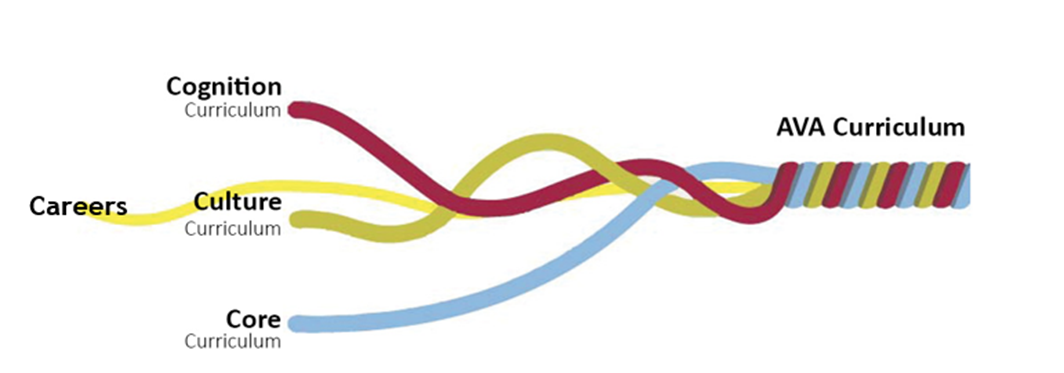
At The Aylesbury Vale Academy, our curriculum intent places a strong emphasis on careers education as an essential component of a learner's holistic development. We believe that preparing students for successful careers is a lifelong journey that begins with the transition from primary to secondary education. During these formative years, we provide invaluable guidance and support to help students navigate their academic path and explore their interests. As they progress through secondary school, our curriculum is designed to assist them in making informed subject choices that align with their career aspirations. This commitment continues post-16 and post-18, where our cross-phase careers program comes into play. We go beyond classroom instruction by organising trips and inviting visitors from colleges and universities to expose our students to a diverse range of educational and career options. As part of our comprehensive careers provision, we incorporate valuable work experience opportunities for Year 10 and Year 12 students, offering them real-world insights and practical skills to enhance their career readiness. Through these experiences and our comprehensive careers guidance, we aim to empower every student at Aylesbury Vale Academy to have the knowledge and confidence to ultimately embark on a successful and fulfilling career journey.
Key Elements of the Core Curriculum
- Hours Per Week
Click on image to expand/download.

